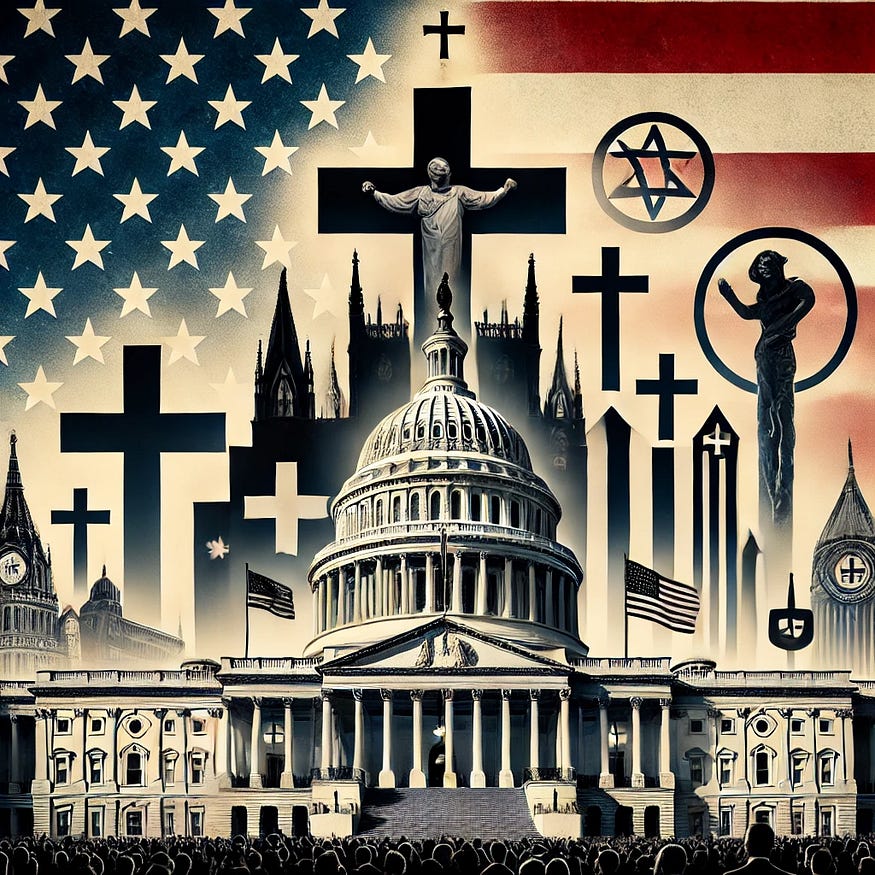Christian Nationalism in the United States and Its Impact on Democracy
Examining the Rise of Religious Nationalism and Its Threat to America’s Democratic Principles

In recent years, Christian Nationalism has emerged as a significant force in American politics, posing serious implications for the nation’s democratic fabric. This ideology merges religious fundamentalism with nationalistic fervor, advocating for a society governed by Christian values as they interpret them. The movement has been gaining traction within the Republican Party, influencing its policies and rhetoric.
The Rise of Christian Nationalism
1. Historical Context:
Foundational Myths: Christian Nationalists often cite the United States’ founding principles as inherently Christian, despite the secular framework established by the Founding Fathers. This mythologizing creates a narrative that America is divinely ordained to uphold Christian morals.
2. Political Infiltration:
Council for National Policy (CNP): Organizations like the secretive CNP play a crucial role in embedding Christian Nationalist ideals within the Republican Party. This group strategically places its members in influential political positions to steer the party towards a more theocratic agenda.
Impact on Democracy
1. Undermining Secularism:
Separation of Church and State: Christian Nationalists challenge the constitutional principle of separating church and state, pushing for laws and policies that reflect their religious beliefs. This threatens the pluralistic foundation of American democracy, where multiple faiths and beliefs coexist.
2. Polarization and Division:
Cultural Wars: The push for Christian-centric policies exacerbates cultural and political divisions. Issues like abortion, LGBTQ+ rights, and education become battlegrounds, further polarizing the electorate.
3. Erosion of Democratic Norms:
Authoritarian Tendencies: The movement’s leaders often exhibit authoritarian tendencies, advocating for a strongman approach to governance. This undermines democratic norms, such as checks and balances, free and fair elections, and the rule of law.
4. Influence on Policy:
Legislation: Christian Nationalists have been successful in influencing legislation at both state and federal levels. From restrictive abortion laws to religious exemptions that undermine anti-discrimination protections, their impact is palpable.
The Way Forward
1. Vigilance and Advocacy:
Public Awareness: Increasing public awareness about the dangers of Christian Nationalism is crucial. Documentaries like “Bad Faith” play an essential role in educating citizens about these threats.
Interfaith Solidarity: Building coalitions across different faith communities can help resist the imposition of a singular religious ideology on the nation.
2. Legal and Political Action:
Protecting Secularism: It is imperative to uphold the constitutional separation of church and state. Legal challenges against unconstitutional laws and policies must be pursued vigorously.
Political Mobilization: Encouraging voter participation and supporting candidates who advocate for democratic values and secular governance is essential.
Conclusion
Christian Nationalism poses a significant threat to the democratic principles of the United States. Its rise within the political landscape necessitates vigilant action from citizens, lawmakers, and religious leaders to safeguard the pluralistic and secular foundations of American democracy. By understanding and addressing the influence of this movement, the nation can strive towards a more inclusive and equitable future.

